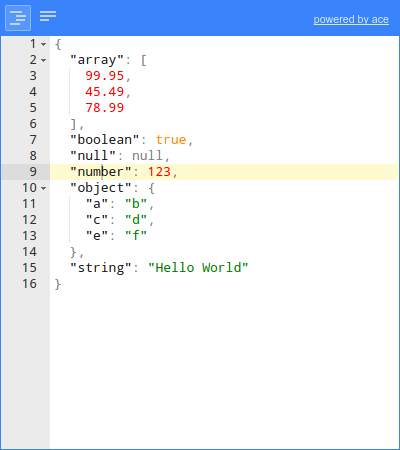JSON Editor is a web-based tool to view, edit, format, and validate JSON. It has various modes such as a tree editor, a code editor, and a plain text editor.
The editor can be used as a component in your own web application. The library can be loaded as CommonJS module, AMD module, or as a regular javascript file.
Supported browsers: Chrome, Firefox, Safari, Opera, Internet Explorer 9+.
Cross browser testing for JSONEditor is generously provided by BrowserStack
- Edit, add, move, remove, and duplicate fields and values.
- Change type of values.
- Sort arrays and objects.
- Colorized code.
- Search & highlight text in the tree view.
- Undo and redo all actions.
- JSON schema validation (powered by ajv).
- Colorized code (powered by Ace).
- Inspect JSON (powered by Ace).
- Format and compact JSON.
- JSON schema validation (powered by ajv).
- Format and compact JSON.
- JSON schema validation (powered by ajv).
with npm (recommended):
npm install jsoneditor
with bower:
bower install jsoneditor
There is a directive available for using JSONEditor in Angular.js:
https://github.com/isonet/angular-jsoneditor
<!DOCTYPE HTML>
<html>
<head>
<!-- when using the mode "code", it's important to specify charset utf-8 -->
<meta http-equiv="Content-Type" content="text/html;charset=utf-8">
<link href="jsoneditor/dist/jsoneditor.min.css" rel="stylesheet" type="text/css">
<script src="jsoneditor/dist/jsoneditor.min.js"></script>
</head>
<body>
<div id="jsoneditor" style="width: 400px; height: 400px;"></div>
<script>
// create the editor
var container = document.getElementById("jsoneditor");
var options = {};
var editor = new JSONEditor(container, options);
// set json
var json = {
"Array": [1, 2, 3],
"Boolean": true,
"Null": null,
"Number": 123,
"Object": {"a": "b", "c": "d"},
"String": "Hello World"
};
editor.set(json);
// get json
var json = editor.get();
</script>
</body>
</html>The code of the JSON Editor is located in the folder ./src. To build
jsoneditor:
-
Install dependencies:
npm install -
Build JSON Editor:
npm run buildThis will generate the files
./jsoneditor.js,./jsoneditor.css, and
minified versions in the dist of the project. -
To automatically build when a source file has changed:
npm run watchThis will update
./jsoneditor.jsand./jsoneditor.cssin the dist folder on every change, but it will NOT update the minified versions as that's an expensive operation.
The source code of JSONEditor consists of CommonJS modules. JSONEditor can be bundled in a customized way using a module bundler like browserify or webpack. First, install all dependencies of jsoneditor:
npm install
To create a custom bundle of the source code using browserify:
browserify ./index.js -o ./jsoneditor.custom.js -s JSONEditor
The Ace editor, used in mode code, accounts for about 75% of the total
size of the library. To exclude the Ace editor from the bundle:
browserify ./index.js -o ./jsoneditor.custom.js -s JSONEditor -x brace -x brace/mode/json -x brace/ext/searchbox
To minify the generated bundle, use uglifyjs:
uglifyjs ./jsoneditor.custom.js -o ./jsoneditor.custom.min.js -m -c


